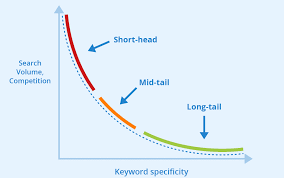Consumers and Terms: Unlocking the Relationship with SEO

Consumers and Terms: Unlocking the Relationship with SEO
Successful SEO tactics are based on the relationship between customers and keywords in the dynamic field of digital marketing, where every keystroke and click matters. Let’s explore this mutually beneficial connection and see why SEO success depends on it.
1. Determining the Intent of the User: Keywords are the terms and expressions that people enter into search engines to find information, goods, or services. Understanding the purpose of the user is crucial to using keywords effectively. Consumers frequently use search queries to convey a variety of purposes. While some are prepared to make a purchase, others could be just beginning their investigation and looking for information. SEO experts match user intent with your content by selecting and focusing on the appropriate keywords, guaranteeing that your website shows in
2. Establishing Contact with Your Goal Audience:
The link that exists between your content and your intended audience is created by keywords. Envision your perfect client looking for a way to solve their issue. It’s like giving them a helping hand right when they need it if your content is optimized for the keywords they employ. Because you’re catering to the particular requirements and interests of potential consumers, this link not only increases the exposure of your website but also increases the likelihood of conversion.
3. Customizing Text for Pertinence:
Keywords are more than simply a string of words; they also allude to the issues that are important to your readers. By using these keywords in your content, you may create useful, pertinent, and educational articles. This meets the expectations of your visitors as well as search engine algorithms. Customers are more inclined to interact with, share, and convert into devoted followers or customers when they believe your material to be relevant and timely.
4. ranks Competition:
The fight for search engine ranks takes place mostly around keywords. To decide which phrases are worth pursuing, SEO experts examine keyword competition. Concentrating on long-tail keywords—more specialized, less competitive phrases—can be a calculated approach to guarantee a higher place in search results, even though high-competition keywords can be difficult. It’s a strategic game in which knowing the language and preferences of your consumers may make all the difference.
5. Adjusting to Customer Behavior: The way users search changes over time. Every now and then, new queries, searches, and trends surface. Businesses are able to adjust and stay relevant by keeping an eye on keyword trends and maintaining aware of client preferences. Search engine optimization (SEO) is a continuous process that involves matching your content to what people are actively looking for.
In SEO, clients and keywords are essentially related to each other like a well-balanced orchestra. Your consumers are the audience, and the keywords are the notes. A successful symphony where your website grows, your audience finds what they need, and your business flourishes is the outcome of precise, relevant, and harmonious play.




